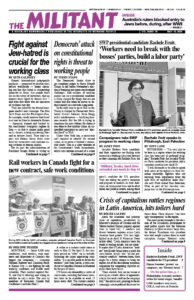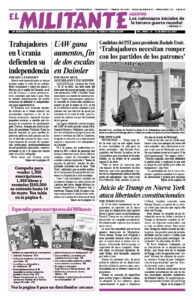SYDNEY — The deadly Oct. 7 pogrom by Hamas and Tehran against Jews in Israel triggered a wave of Jew-hatred across Australia. Hamas supporters here celebrated the bloodbath Oct. 8 and 9 and chanted against Jews.
Physical assaults, verbal abuse and harassment of Jews have sharply increased. Jewish businesses have been vandalized and boycotted. Some 600 Jewish people involved in the arts had their names and personal details posted on social media in February by anti-Israel activists, leading to harassment, death threats and job losses.
Last November, more than 100 Australian Holocaust survivors signed a statement against the surge in antisemitism. “Never did we think that we would witness a re-enactment of the senseless and virulent hatred of Jews that we faced in Europe,” it said.
Until Oct. 7, many Jewish immigrants here had the illusion that Australia could be a new “golden country” for Jews. But Jew-hatred isn’t new in Australia.
Like other “democratic” imperialist governments, Canberra refused to open its doors to Jews trying to escape the Nazi regime in the lead-up to World War II. Antisemitism was whipped up to justify strict immigration restrictions.
After Kristallnacht, the Nazi pogrom against Jews in Germany, in 1938, Aboriginal leader William Cooper led a march to the German Consulate in Melbourne. They protested “the cruel persecution of the Jewish people by the Nazi government in Germany” and demanded that the Jew-hating violence “be brought to an end.”
That year, some 50,000 applications had been received by Australia from Jews wanting to escape from the Nazi terror. At a conference on this refugee crisis held in Evian, France, Canberra refused to increase its annual quota of 5,000 immigrants per year. Its representative, Thomas White, said his government remained committed to its policy of favoring British migration. “Australia does not have a racial problem and is not desirous of importing one,” he said.
Fewer than 8,000 Jews gained entry to Australia and some 1,100 Jews made their way to New Zealand between 1933 and 1939.
After the war’s outbreak however, the Australian government agreed to accept Jews classified as “enemy aliens,” who had been imprisoned in Britain. Camps there were overcrowded following the mass internment of German and Italian nationals, including large numbers of refugees, many of whom were Jews.
Some 7,500 internees were shipped to Canada and Australia in 1940. One of the transport ships bound for Canada was torpedoed and sunk. A number of the survivors were then deported to Australia on the Dunera, a military transport ship that carried more than 2,500 internees, two-thirds of whom were Jewish, shipped together with 450 German and Italian prisoners of war. Conditions on the ship were appalling, with prisoners beaten and abused.
On arrival they were interned in camps at Tatura in Victoria and Hay in New South Wales. There was no separation of Nazi supporters and Jews. The only way for Jews to get out of the camps was to enlist in the Australian armed forces. Many of them remained in Australia. By 1942 most had been released from the camps.
Jewish refugees from Europe who had made their way to Singapore, then a British colony, were also interned as London declared war on Germany. Some 230 of them were expelled and shipped to Sydney, from where they were sent to the Tatura prison camp.
After the war, the Australian government made changes to immigration laws to help meet the needs of bosses for labor. Increased numbers of immigrants from Europe were accepted, including Holocaust survivors. In 1945 Labor Minister for Immigration Arthur Calwell hypocritically announced that 2,000 close relatives of Jews already resident in Australia would be granted entry “on humanitarian grounds.”
Some Jewish refugees in Shanghai, China, were able to take advantage of this new policy. Of the 18,000 Jews who had fled Europe to Asia, many ended up in Shanghai, where they were permitted to stay without a visa. But the Australian consul in Shanghai responsible for immigration classified Jews stranded there as “thoroughly undesirable.” As a result, no more than 1,500 Jews from China managed to enter Australia.
A virulent campaign in some of the press and by a number of prominent politicians was launched against Jewish immigration. In 1946, Liberal Party member Henry “Jo” Gullett said in Parliament: “We are not compelled to accept the unwanted of the world at the dictate of the United Nations or anyone else.” Antisemitic cartoons were run in leading papers like the Bulletin and Truth.
In 1947 Calwell placed new limits on the number of Jews entering Australia — a quota of no more than 25% of Jews on any ship could come to Australia. A clause on immigration forms asking, “Are you a Jew?” had been introduced by the government in 1939 and remained there until 1953.
Some 31,000 Holocaust survivors were eventually settled in Australia. While the size of the Jewish population here has increased to about 120,000 today, immigration restrictions have ensured that it remained less than 0.5% of the total population. However, given the slaughter of 6 million Jews in the Holocaust, this is now the eighth largest Jewish population in the world.
The antisemitic record of Australia’s rulers and today’s resurgence of Jew-hatred confirms that there is no solution to the Jewish question under capitalism. “Fighting antisemitism is at the center of my campaign,” Robert Aiken, Communist League candidate for mayor of Liverpool, Sydney, told the Militant April 27. “It is a deadly illusion that the government can be relied on for protection. Workers and our unions must organize against all attacks on Jews.”


